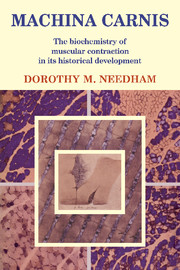Book contents
- Frontmatter
- Contents
- Preface
- Acknowledgments
- List of abbreviations
- 1 Bringing muscles into focus; the first two millennia
- 2 Muscle metabolism after the Chemical Revolution; lactic acid takes the stage
- 3 The relationship between mechanical events, heat production and metabolism; studies between 1840 and 1930
- 4 The influence of brewing science on the study of muscle glycolysis; adenylic acid and the ammonia controversy
- 5 The discovery of phosphagen and adenosinetriphosphate; contraction without lactic acid
- 6 Adenosinetriphosphate as fuel and as phosphate-carrier
- 7 Early studies of muscle structure and theories of contraction, 1870–1939
- 8 Interaction of actomyosin and ATP
- 9 Some theories of contraction mechanism, 1939 to 1956
- 10 On myosin, actin and tropomyosin
- 11 The sliding mechanism
- 12 How does the sliding mechanism work?
- 13 Excitation, excitation-contraction coupling and relaxation
- 14 Happenings in intact muscle: the challenge of adenosinetriphosphate breakdown
- 15 Rigor and the chemical changes responsible for its onset
- 16 Respiration
- 17 Oxidative phosphorylation
- 18 The regulation of carbohydrate metabolism for energy supply to the muscle machine
- 19 A comparative study of the striated muscle of vertebrates
- 20 Enzymic and other effects of denervation, cross-innervation and repeated stimulation
- 21 Some aspects of muscle disease
- 22 Contraction in muscles of invertebrates
- 23 Vertebrate smooth muscle
- 24 Energy provision and contractile proteins in non-muscular functions
- The perspective surveyed
- References
- Author index
- Subject index
21 - Some aspects of muscle disease
Published online by Cambridge University Press: 04 August 2010
- Frontmatter
- Contents
- Preface
- Acknowledgments
- List of abbreviations
- 1 Bringing muscles into focus; the first two millennia
- 2 Muscle metabolism after the Chemical Revolution; lactic acid takes the stage
- 3 The relationship between mechanical events, heat production and metabolism; studies between 1840 and 1930
- 4 The influence of brewing science on the study of muscle glycolysis; adenylic acid and the ammonia controversy
- 5 The discovery of phosphagen and adenosinetriphosphate; contraction without lactic acid
- 6 Adenosinetriphosphate as fuel and as phosphate-carrier
- 7 Early studies of muscle structure and theories of contraction, 1870–1939
- 8 Interaction of actomyosin and ATP
- 9 Some theories of contraction mechanism, 1939 to 1956
- 10 On myosin, actin and tropomyosin
- 11 The sliding mechanism
- 12 How does the sliding mechanism work?
- 13 Excitation, excitation-contraction coupling and relaxation
- 14 Happenings in intact muscle: the challenge of adenosinetriphosphate breakdown
- 15 Rigor and the chemical changes responsible for its onset
- 16 Respiration
- 17 Oxidative phosphorylation
- 18 The regulation of carbohydrate metabolism for energy supply to the muscle machine
- 19 A comparative study of the striated muscle of vertebrates
- 20 Enzymic and other effects of denervation, cross-innervation and repeated stimulation
- 21 Some aspects of muscle disease
- 22 Contraction in muscles of invertebrates
- 23 Vertebrate smooth muscle
- 24 Energy provision and contractile proteins in non-muscular functions
- The perspective surveyed
- References
- Author index
- Subject index
Summary
The subject of muscle diseases is a very wide and intricate one, and here we shall deal only with biochemical research on two forms – progressive muscular dystrophy and glycogen storage disease. This chapter came to be written because the muscle biochemist is so often confronted with the question ‘Does all this research on muscle help in the cure of muscle diseases?’ The short answer at present is ‘No’ as far as these two types are concerned. Both are hereditary, and in the case of glycogen storage disease the defect has been traced in different types to lack of a particular enzyme. In the case of progressive muscular dystrophy it has been considered clear that the primary cause is in the muscle itself and not in any deterioration of its nerve supply, but in spite of much experimentation this cause has not been found. Nevertheless much ground has been cleared, and we can say a little about the various views held as to possible causes. It must, however, always be remembered in what follows that the work of the last few years on the effects of cross-innervation on the enzyme patterns of red and white muscles suggests that the nerve supply exerts a more subtle influence on muscle metabolism than had previously been realised. The possibility thus remains that in muscular dystrophy some specific change occurs in the nerve without visible degeneration.
- Type
- Chapter
- Information
- Machina CarnisThe Biochemistry of Muscular Contraction in its Historical Development, pp. 499 - 513Publisher: Cambridge University PressPrint publication year: 1971

